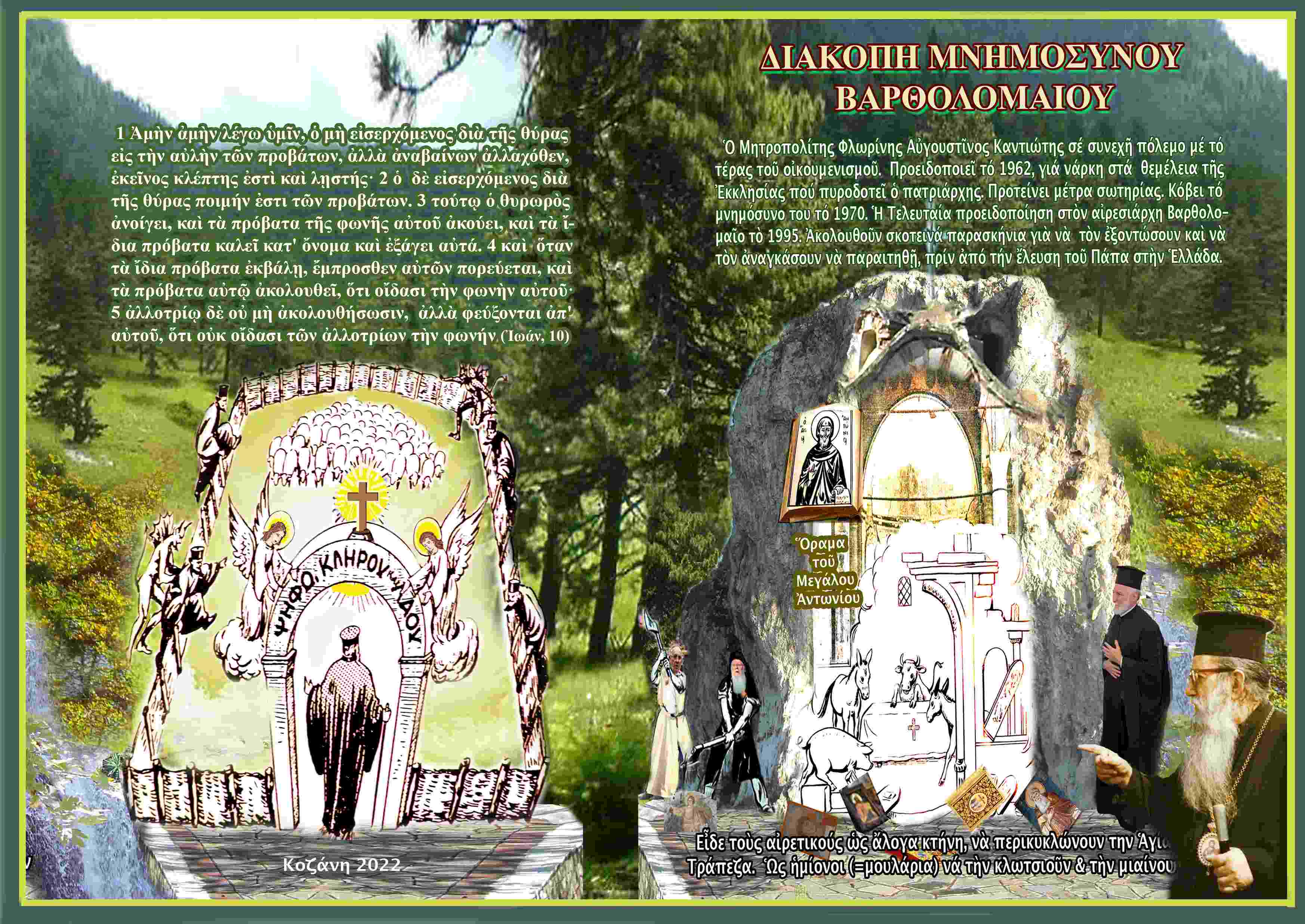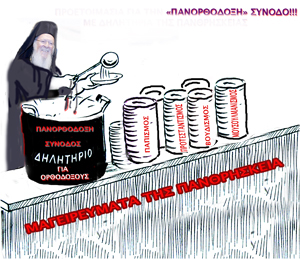A Response To The Critics Of The Sacred Canons (ΑΠΑΝΤΗΣΗ ΣΤΟΥΣ KATHΓΟΡΟΥΣ ΤΩΝ ΙΕΡΩΝ ΚΑΝΟΝΩΝ)
 Ιούλ 6th, 2016 |
Ιούλ 6th, 2016 |  Filed under: English, ΑΝΤΙΑΙΡΕΤΙΚΑ
Filed under: English, ΑΝΤΙΑΙΡΕΤΙΚΑ
Kyriaki – Sunday Sermonette
Issue No. 1858
Metropolitan Avgoustinos (Kantiotes) of Florina
A Response To The Critics Of The Sacred Canons
ΑΠΑΝΤΗΣΗ ΣΤΟΥΣ ΚΑΤΗΓΟΡΟΥΣ ΤΩΝ Ι. ΚΑΝΟΝΩΝ.pdf
This past July, in the occasion of the remembrance of the Fathers of the 4th Ecumenical Synod we opened an issue. The memory now of the Fathers of the 7th Ecumenical Synod and the spirit of the undervaluing as much of the holy fathers (“metapatristic” theology) as much as the sacred canons (“codification”), give us again the opportunity to continue setting forth the related teaching of father Augustinos concerning the sacred canons drawing from his works.
If, my beloved, one steeps oneself in the study of the sacred canons as wise canon law specialists of the Orthodox Church interpret them, and indeed as saint Nicodemos the Hagiorite does; if above all he or she believes that the sacred canons are decisions not of a certain ministerial council or of some council but of sacred men who come together and deliberate in holy Spirit, then he will see them in a different light. He will see the depth of patristic thought and not the surface, the spirit and not the letter. “The letter kills, but the spirit gives life” (2 Cor 3.6). The essence, which is contained in the forms of the sacred canons, have eternal value.
Certain ones, in order to spurn and mock the sacred canons, refer to some of them which touch upon different questions of moral order, and standing firmly behind their letter maintain that the canons no longer have a place in contemporary life.
We answer them the following.
They say that the canons, since they were instituted 1.200 – 1.600 years ago, are excessively old. They forget however, that certain things don’t grow old. For example the sun, which despite its age is for all absolutely indispensable. Can the sun be abolished.
But whatever the sun is for the material universe, the moral law is for the spiritual universe, the immortal words of the Nazarene in the Gospel; they are light, towards which souls that seek the truth hasten to. “With my soul I have desired you in the night, Yes by my spirit within me I will seek you early. For your judgments are light upon the earth” shouts the prophet Isaiah (26.9). However many centuries pass and however many changes occur, the evangelical law will continue to be in force. The soul of man, as Tertullian would say, is by nature Christian.
And the sacred canons are rays of the spiritual sun, which come down to the details of our life for our sanctification and break apart in the colors of the various virtues. The sacred canons are bright rays, a refulgence of the light of the Gospel. Whichever canon you examine, you will see that it is not self-subsistent but it is supported in some god-inspired word of holy Scripture, which it wants to apply in a certain instance of human life.
The sun doesn’t change; and the morality of the Gospel, as it is expressed in the sacred canons, doesn’t change. It remains the same, however many centuries go by. The Lord said it: “Heaven and earth will pass away, but my words will not pass away” ( Matt. 24.35)
The sacred canons, they say, are not only very old but also are not capable of being applied. So Christian morality is unapplicable which the canons recommend? Unapplicable is fasting, frequent church attendance, confession, virginal life, monogamy and the life-long nature of marriage, lack of the love of money and poverty?… No! So long as even just one person on earth will enforce in his or her life the commandments of the moral law, it suffices to prove that Christian morality is not incapable of being applied. For, whatever one person does, many also can do, since they are of that same nature. If, now, many don’t want to conform with the commands of the sacred canons, the cause is not the canons but their will which doesn’t subject itself to the divine will. There are medications for radical therapy; but if the sick person, despite the recommendations of the doctor, does not want to take them and dies, the cause of death is not the doctor but the sick person.
We don’t agree with those who say that, because society is evolving and changing, the Church, too, for the sake of the many must conform to the demands of the times and abolish the sacred canons. Let them hear the eternal words which the Lord spoke: “Enter through the narrow gate; for broad is the gate and wide is the road leading to perdition, and many are those who enter through it. Narrow is the gate and full of sorrows is the road leading unto life, and few are those who find it!” (Matt. 7.13-14).
If the Church of Christ begins to follow the current of the world, she will become unrecognizable. If, for example, tomorrow the world legalizes homosexuality and recognizes the marriage of homosexuals, what, the Church with her priests must bless this cursed bond? And if still all of society ends up becoming Sodom and Gomorrah and the faithful remain few, the Church shall not retreat. She will remain in her positions without retreating. She will remain, that is, anachronistic in matters of moral principles; and showing steadily the all-clear sky of moral values she will bring the highest service to humanity which is in danger of being buried in corruption.
There are, however, they say also certain canons which have a case character, because they refer to matters agitated the Church at some time…But because certain heretical teachings and errors, for which special measures were taken and particular medicines were recommended, disappeared, those special medications lose their value? No. They will be kept in the pharmacy of the Church and, if by chance there appear similar cases of psychical illnesses, they will be set in use yet again. But what is most important here is the following: who is the one who will characterize a canon as being by case or will establish new canons which at all events won’t be contrary with the spirit of previous sacred canons? Not, of course, the x or y rationalist or unbeliever, but the Church of Christ in holy regional or ecumenical Synods.
The critics, finally, are afraid that the recognition of the validity of the canons will strengthen the “zealots” to enforce a medieval society. Bravo to them, they have diagnosed the danger that our region is facing! But the “zealots”, about whom they speak so disdainfully, apart from there faith in the word of God, have no other weapon. Neither tanks nor planes to overthrow regimes. Others have these things at their disposal. The faithful don’t become violent overthrowers. Martyrs and confessors yes, overthrowers through violence no. As many time there appeared these rare men who long for the glory of God, they were persecuted, humiliated, annihilated and found a martyric death at the hands of ceasar. The world wants a Christianity that’s mediocre and cool. No, sirs! Christianity has high targets. With the application of the sacred canons, our society will become a state of God’s, a true colony of angels; while with the trampling and spurning of the canons it is in danger of becoming a nation of amoralists, who according to the prophesy of saint Kosma the Aeotolian will live like the unbridled animals and even worse.
***
The sacred canons, my beloved, are bright pointers in the journey upwards. They are bridles for the swinish appetites of man. They are a rudder in a wild sea. They are, to use a hagiographical icon, a damn which the Lord set around His god-planted Vineyard (Matt21.33; Mark 12.1), so that wild animals don’t overrun into it, foxes and wild boars; (Psalms 79.13), and eat the fruits and tear apart the roots. The sacred canons or laws of the Church are, to remember also the wisdom of our progenitors, like the powerful walls of cities, upon which stand the courageous supporters and repel the attacks of the barbarians. Without walls the ancient cities were vulnerable; but also, without steady laws societies fall and are dissolved. And what other laws are brighter, more beautiful, more beneficial, more perfect than the sacred canons of the holy ecumenical and regional Synods?
Behold, my beloved, our radical antithesis and disagreement with the disdainers of the sacred canons. We are not struggling for some unessential details, but for sacred canons. And we declare, that for the validity of the sacred canons we shall struggle to the end. In our ears echo the words of the ancient philosopher Heracletos: “The people must support the laws just as it supports the wall of its city”.
+ bishop Augustinos



Add A Comment
You must be logged in to post a comment.